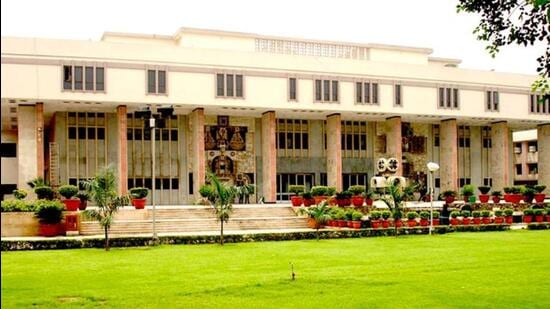Challenge to AAP MLA’s 2022 election in bypoll is triable: Delhi HC
Durgesh Pathak won the bypoll from the Rajinder Nagar seat. A voter from the constituency alleging that he had acted contrary to the provisions laid down under law
The Delhi high court has held that a petition challenging Aam Aadmi Party (AAP) leader Durgesh Kumar Pathak’s election in the 2022 assembly bypolls is prima facie maintainable and triable.

Pathak won the bypoll from the Rajinder Nagar seat. However, Rajan Tewari, a voter from the constituency, sought to declare Pathak’s election as void, alleging that the AAP leader had acted contrary to the provisions laid down under the Representation of People Act, 1951 and even his conduct and declarations were in violation of the mandate of the Constitution and Model Code of Conduct, and that he misled the voters by hiding details about his income and committed an act of corrupt practice by overstating his net worth.
The AAP leader later moved the high court, seeking to dismiss the case.
Hearing the matter, a bench of justice Yashwant Varma rejected Pathak’s application filed under order VII rule XI of the Code of Civil Procedure (CPC), saying that “at this stage”, the court does not find any “justification” to reject the election petition.
Order VII rule XI of CPC deals with various grounds on which a court can reject a complaint. To be sure, the provision comes into play when a court finds that allegations taken at their face value do not give rise to triable issues or questions.
“Consequently, although we have found in favour of the applicant insofar as the office of profit, disclosure of ITR (income tax returns) and overestimation of shareholding questions are concerned… we consequently find no justification to reject the election petition at this stage and on that score,” the bench said in its verdict delivered on Monday.
In his application, Pathak represented by advocate Gautam Narayan had asserted that the plea failed to disclose a cause of action and failed to meet the standards which imbue verification of election petitions. Narayan also argued that Tewari’s allegation regarding non-disclosure was premised on the fact that his client had failed to mention the details pertaining to him being named as an accused in one of the FIRs. He said that the law only obligated a candidate to disclose details of only such criminal cases in which either charges had been framed by the court or where cognisance was taken.
Rejecting Narayan’s contention, the court observed that the aspect of declarations being made with respect to the FIR in question clearly gave rise to a triable issue and appeared to be an aspect of contestation worthy of a more elaborate consideration.
“In the considered opinion of the Court, the amendments in Form 26 which came about between 2012 and 2018 clearly give rise to triable issues on which parties would have to be heard. This more so since the distinguishing features that have been discerned did not form subject matter of the oral submissions which were addressed. In fact, and as was pointed out earlier, neither side had even brought those amendments to the notice of the Court. Much of the material which has been noticed in the preceding paragraphs has been independently collated by the Court and the ends of justice would thus warrant parties being placed on due notice lest prejudice be caused to either side,” the court maintained.
Narayan had also contended that there was abject failure on Tewari’s part to assert that his client was holding an office of profit on the date of submission or scrutiny of nominations. While, Tewari represented through advocate Apoorv Karup contended that the petition also pleaded all material facts regarding Pathak even holding an office of profit.
The court in its 103-page verdict opined that Tewari’s allegation regarding Pathak holding office of profit clearly failed to plead material facts. “The Court is also constrained to observe that mere information displayed on a web portal would not absolve the election petitioner from positively asserting that the respondent no.1 did in fact hold an office of profit on the relevant date and thus contravening Article 191 of the Constitution as well as Section 100(1)(a) of the Act. It was thus incumbent upon the election petitioner to positively aver that the respondent no.1 held an office of profit thus rendering him disqualified on the date of election. This allegation framed in mere inquisitorial terms cannot be countenanced,” the court said.
Stay updated with all top Cities including, Bengaluru, Delhi, Mumbai and more across India. Stay informed on the latest happenings in World News along with Delhi Election 2025 and Delhi Election Result 2025 Live, New Delhi Election Result Live, Kalkaji Election Result Live at Hindustan Times.
Stay updated with all top Cities including, Bengaluru, Delhi, Mumbai and more across India. Stay informed on the latest happenings in World News along with Delhi Election 2025 and Delhi Election Result 2025 Live, New Delhi Election Result Live, Kalkaji Election Result Live at Hindustan Times.






